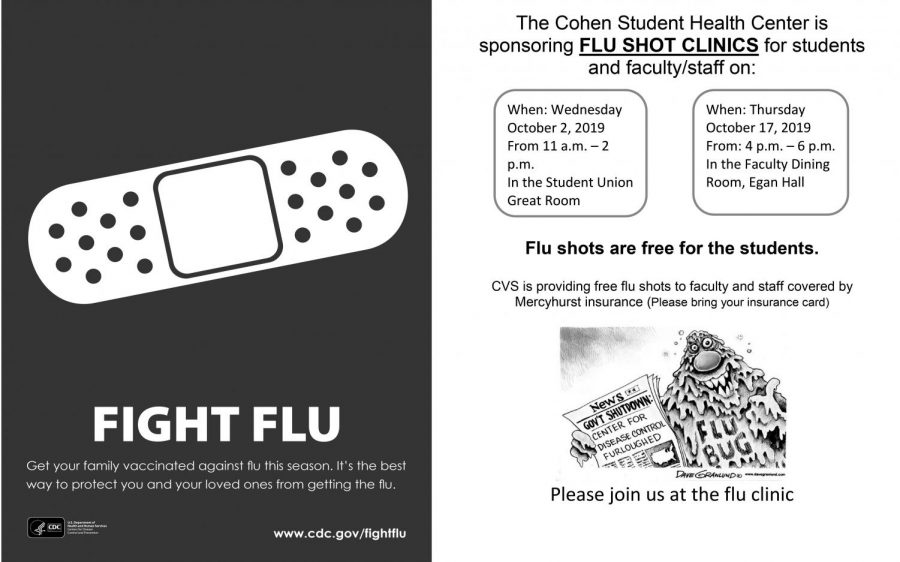Flu Shot Clinics offered this fall
October 3, 2019
October marks the beginning of the dreaded flu season. Although it starts yearly in the year, the flu virus is often passed around all the way through April. The Mercyhurst Cohen Health Center will have two flu clinics open to both students, faculty and staff this fall.
The first flu shot clinic will be on Oct. 2 in the Student Union Great Room from 11 a.m. to 2 p.m. The second will be on Oct. 17 in the Faculty Dining Room from 4 p.m. to 6 p.m.
Any students, faculty, staff, administrators and their spouses are welcome to attend with no need for an appointment.
The clinics are free to all Mercyhurst University students on the Erie campus, and to employees and spouses covered by Mercyhurst’s health insurance. Students do not need to bring anything with them and Mercyhurst faculty and staff with university health insurance just need to bring their insurance cards to the clinic.
“On Oct. 17, we’ll be over at the Faculty Dining Room, which makes it really easy for students who are coming for dinner to just slide on in,” Smith said. “That time is very easy for faculty and staff who are maybe getting ready to go home for the night.”
The vaccines will be administered by the Cohen Health Center nurses and CVS pharmacists will vaccinate Mercyhurst employees.
Judy Smith, Ph.D., Executive Director of Wellness, urges students to attend the clinics to be sure that what may appear as a common cold is not something more serious.
“It’s not an effort to scare people about the flu, but to be aware that it is more than a cold,” Smith said.
Smith wants people to be aware of the signs of a flu that can appear quickly, especially on a close community like a college campus. The more people that get vaccinated, the less likely the flu is to take hold of the campus.
Sneezing and having a sore throat are more common in a cold than the flu, while a fever is a more common symptom. The onset of symptoms is quicker and those with it are likely to be very achy.
“The flu is an upper respiratory viral illness so it can share some common characteristics with a cold,” Smith said. “However, when you get a cold, you usually get it gradually. You wake up and your nose is a little bit stuffy. By the end of the day or the next day your nose is starting to run. You know, it’s gradual.”
Once a person has the flu, they can be infectious for about 3 to 4 days, after coming down with the symptoms. Some people can even be infectious for a day before the symptoms begin and not be aware they have the flu. It can be spread before symptoms even begin to appear.
“With a cold, it would be very rare to end up in the hospital, but with the flu, not so much,” Smith said. “There’s going to be a chunk of people that end up in the hospital and there is also going to be deaths from it.”
While practicing good hygiene and preventative health methods is always a positive measure to take, nothing can replace the vaccine itself according to Smith.
“The number one best way is to get the flu vaccine,” said Smith. “Aside from the flu shot, there are a few other ways you can prevent it. One of the very first things that we talk about with that is if you’re sick, stay away from people.”
Many people are wary about the side effects of the flu shot or its effectiveness in general.
“The vaccine can’t really give you the flu,” Smith said. “They use a common technique where they use one gene from the flu virus so it’s enough for your body to form antibodies against it, but not enough to get you sick.”
Smith stated that the biggest complaint she has heard is that the arm that got the shot may feel red, tender and sore, or that the patient may feel a bit unwell at the time.
Students protect not only their health, but the health of everyone on campus community by attending the free clinics.
“When you get the flu shot, not only do you protect you, but you potentially protect other people that sit in the classroom with you, that sit in the dining hall with you,” Smith said.
There will also be flu clinics on the North East campus this fall, with details to follow soon. For more information about the North East flu clinics, contact Deborah Krause MSN, RN, CCM, at dkrause@mercyhurst.edu.
For more information on the flu virus, the October clinics this year or for questions about flu-like symptoms, contact the Cohen Health Center at 814-824-2431 or email health@mercyhurst.edu.
“You can always call over to the Health Center and let people know what the symptoms are,” Smith said. “Make an appointment, come on over.”

